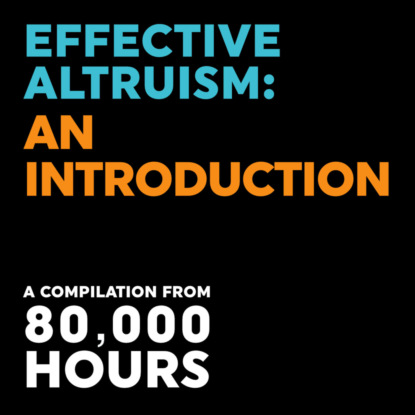6+
Podkast haqida
A collection of ten top episodes of the 80,000 Hours Podcast, specifically selected to help listeners get up to speed on effective altruism as quickly as possible.
Effective Altruism: An Introduction is a collection of ten top episodes of The 80,000 Hours Podcast specifically selected to help listeners quickly get up to speed on the school of thought known as effective altruism. Here the host of the show — Rob Wiblin — briefly explains what effective altruism is all about, and what to expect from the rest of this series.
Both the Green Revolution and the contraceptive pill are widely recognised as scientific breakthroughs that transformed the world. But few know that those breakthroughs only happened when they did because of a philanthropist willing to take a risky bet on a new idea.
Toby Ord makes the case that of all the people whose well-being we should care about, only a small fraction are alive today. The rest are members of future generations who are yet to exist. Whether they’ll be born into a world that is flourishing or disintegrating is in large part up to us.
The effective altruist research community tries to identify the highest impact things people can do to improve the world. Unsurprisingly, given the difficulty of such a massive and open-ended project, very different schools of thought have arisen about how to do the most good.
Today’s guest, Alexander Berger, leads Open Philanthropy’s ‘Global Health and Wellbeing’ programme, where he oversees around $175 million in grants each year, and ultimately aspires to disburse billions in the most impactful ways he and his team can identify.
In this conversation from 2021, Alexander explains the case in favour of adopting the ‘global health and wellbeing’ mindset, while going through the arguments for the longtermist approach that he finds most and least convincing.
This episode first broadcast on the regular 80,000 Hours Podcast feed on July 12, 2021. Some related episodes include:
#22 – Dr Leah Utyasheva on the non-profit that figured out how to massively cut suicide rates #37 – GiveWell picks top charities by estimating the unknowable. James Snowden on how they do it. #83 – Jennifer Doleac on ways to prevent crime other than police and prisons
Series produced by Keiran Harris.
Spencer Greenberg, founder of ClearerThinking.org has a process for working out real life problems.
Imagine that humanity has two possible futures ahead of it: Either we’re going to have a huge future like that, in which trillions of people ultimately exist, or we’re going to wipe ourselves out quite soon, thereby ensuring that only around 100 billion people ever get to live.
If there are eventually going to be 1,000 trillion humans, what should we think of the fact that we seemingly find ourselves so early in history? If the future will have many trillions of people, the odds of us appearing so strangely early are very low indeed.
If we accept the analogy, maybe we can be confident that humanity is at a high risk of extinction based on this so-called ‘doomsday argument‘ alone.
There are many critics of this theoretical ‘doomsday argument’, and it may be the case that it logically doesn’t work. This is why Ajeya Cotra — a senior research analyst at Open Philanthropy — spent time investigating it, with the goal of ultimately making better philanthropic grants.
In this conversation from 2021, Ajeya and Rob discuss both the doomsday argument and the challenge Open Phil faces striking a balance between taking big ideas seriously, and not going all in on philosophical arguments that may turn out to be barking up the wrong tree entirely.
This episode first broadcast on the regular 80,000 Hours Podcast feed on January 19, 2021. Some related episodes include:
#45 – Prof Tyler Cowen's stubborn attachments to maximising economic growth, making civilization more stable & respecting human rights #40 – Katja Grace on forecasting future technology & how much we should trust expert predictions. #42 – Amanda Askell on moral empathy, the value of information & the ethics of infinity #3 – Dario Amodei on OpenAI and how AI will change the world for good and ill #41 – David Roodman on incarceration, geomagnetic storms, & becoming a world-class researcher #10 – Dr Nick Beckstead on how to spend billions of dollars preventing human extinction #62 – Paul Christiano on messaging the future, increasing compute, & how CO2 impacts your brain.
Series produced by Keiran Harris.
Have you ever been infuriated by a doctor's unwillingness to give you an honest, probabilistic estimate about what to expect? Or a lawyer who won't tell you the chances you'll win your case?
The barista gives you your coffee and change, and you walk away from the busy line. But you suddenly realise she gave you $1 less than she should have. Do you brush your way past the people now waiting, or just accept this as a dollar you’re never getting back? According to Hilary Greaves, this simple decision will alter the identities of almost all future generations.
The 80,000 Hours Podcast is about “the world’s most pressing problems and how you can use your career to solve them”, and in this episode we tackle that question in the most direct way possible.
Benjamin Todd gives his thoughts on what effective altruism really is, how it's framed, and how people misunderstand it.
